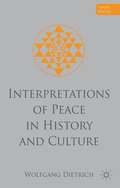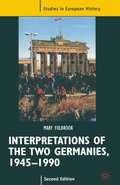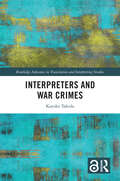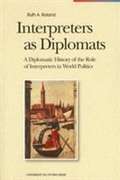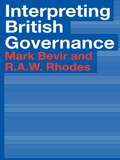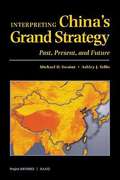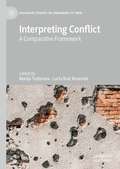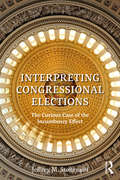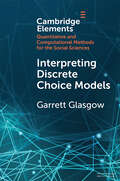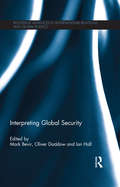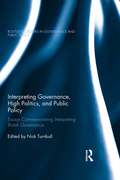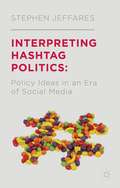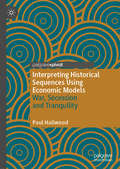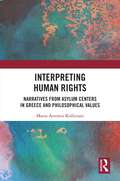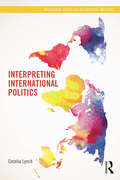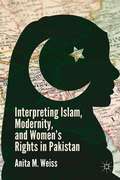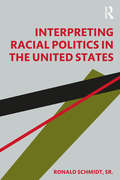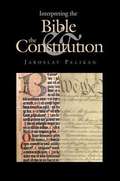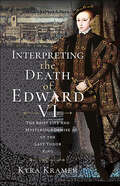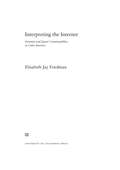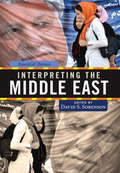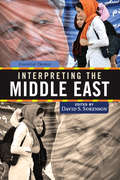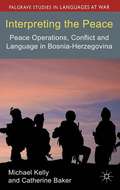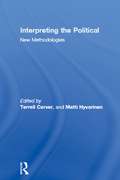- Table View
- List View
Interpretations of Peace in History and Culture
by Wolfgang DietrichThis is the first volume in the trilogy 'Many Peaces' on transrational peace and elicitive conflict transformation. It proposes an innovative analysis of peace interpretations in global history and contemporary cultures of peace, the so-called five families of energetic, moral, modern, post-modern, and transrational.
Interpretations of the Two Germanies
by Mary FulbrookThe two Germanies, arising from the unpromising ashes of defeated Nazi Germany, came to represent opposing models of state and society. The Federal Republic established itself as a remarkably stable democracy and successful social market economy: the German Democratic Republic developed an apparently exemplary form of 'actually existing socialism' and became a pillar of the Soviet bloc. Then in 1989, the 'gentle revolution' in East Germany added a new twist with the collapse of Communist rule. With rapid reunification, the united Germany of 1990 faced new challenges as the unprecedented transformation created a multitude of economic problems and social tensions. Previously published in 1992 as The Two Germanies, this book has been fully revised and updated to take account of all the latest developments in contemporary German history.
Interpreters and War Crimes (Routledge Advances in Translation and Interpreting Studies)
by Kayoko TakedaTaking an interdisciplinary approach, this book raises new questions and provides different perspectives on the roles, responsibilities, ethics and protection of interpreters in war while investigating the substance and agents of Japanese war crimes and legal aspects of interpreters’ taking part in war crimes. Informed by studies on interpreter ethics in conflict, historical studies of Japanese war crimes and legal discussion on individual liability in war crimes, Takeda provides a detailed description and analysis of the 39 interpreter defendants and interpreters as witnesses of war crimes at British military trials against the Japanese in the aftermath of the Pacific War, and tackles ethical and legal issues of various risks faced by interpreters in violent conflict. The book first discusses the backgrounds, recruitment and wartime activities of the accused interpreters at British military trials in addition to the charges they faced, the defence arguments and the verdicts they received at the trials, with attention to why so many of the accused were Taiwanese and foreign-born Japanese. Takeda provides a contextualized discussion, focusing on the Japanese military’s specific linguistic needs in its occupied areas in Southeast Asia and the attributes of interpreters who could meet such needs. In the theoretical examination of the issues that emerge, the focus is placed on interpreters’ proximity to danger, visibility and perceived authorship of speech, legal responsibility in war crimes and ethical issues in testifying as eyewitnesses of criminal acts in violent hostilities. Takeda critically examines prior literature on the roles of interpreters in conflict and ethical concerns such as interpreter neutrality and confidentiality, drawing on legal discussion of the ineffectiveness of the superior orders defence and modes of individual liability in war crimes. The book seeks to promote intersectoral discussion on how interpreters can be protected from exposure to manifestly unlawful acts such as torture.
Interpreters as Diplomats: A Diplomatic History of the Role of Interpreters in World Politics
by Ruth A. RolandThis book looks at the role played throughout history by translators and interpreters in international relations. It considers how political linguistics function and have functioned throughout history.
Interpreting British Governance
by Mark Bevir Rod RhodesHow is Britain governed? Have we entered a new era of governance? Can traditional approaches to governance help us to interpret 21st century Britain?This book develops the argument that we can understand political practices only by grasping the beliefs on which people act. It offers a governance narrative as a challenge to the Westminster model of British government and searches for a more accurate and open way of speaking about British government.
Interpreting China's Grand Strategy: Past, Present, and Future
by Sara A. Daly Peter W. Greenwood Michael D. SwaineChina's continuing rapid economic growth and expanding involvement in global affairs pose major implications for the power structure of the international system. To more accurately and fully assess the significance of China's emergence for the United States and the global community, it is necessary to gain a more complete understanding of Chinese security thought and behavior. This study addresses such questions as: What are China's most fundamental national security objectives? How has the Chinese state employed force and diplomacy in the pursuit of these objectives over the centuries? What security strategy does China pursue today and how will it evolve in the future? The study asserts that Chinese history, the behavior of earlier rising powers, and the basic structure and logic of international power relations all suggest that, although a strong China will likely become more assertive globally, this possibility is unlikely to emerge before 2015-2020 at the earliest. To handle this situation, the study argues that the United States should adopt a policy of realistic engagement with China that combines efforts to pursue cooperation whenever possible; to prevent, if necessary, the acquisition by China of capabilities that would threaten America's core national security interests; and to remain prepared to cope with the consequences of a more assertive China.
Interpreting Conflict: A Comparative Framework (Palgrave Studies in Languages at War)
by Marija Todorova Lucía Ruiz RosendoThis edited book examines the role of interpreting in conflict situations, bringing together studies from different international and intercultural contexts, with contributions from military personnel, humanitarian interpreters and activists as well as academics. The authors use case studies to compare relevant notions of interpreting in conflict-related scenarios such as: the positionality of the interpreter, the ethical, emotional and security implications of their work, the specific training needed to carry out work for military and humanitarian organizations, and the relations of power created between the different stakeholders. The book will be of interest to students and scholars of translation and interpreting, conflict and peace studies, as well as conflict resolution and management.
Interpreting Congressional Elections: The Curious Case of the Incumbency Effect
by Jeffrey M. StonecashThe increase in the "incumbency effect" has long dominated as a research focus and as a framework for interpreting congressional elections. This important new book challenges the empirical claim that incumbents are doing better and the research paradigm that accompanied the claim. It also offers an alternative interpretation of House elections since the 1960s. In a style that is provocative yet fair, learned, and transparent, Jeffrey Stonecash makes a two-pronged argument: frameworks and methodologies suffer when they stop being critically considered, and patterns of House elections over the long term actually reflect party change and realignment. A must-read for scholars and students of congressional elections.
Interpreting Discrete Choice Models (Elements in Quantitative and Computational Methods for the Social Sciences)
by Garrett GlasgowIn discrete choice models the relationships between the independent variables and the choice probabilities are nonlinear, depending on both the value of the particular independent variable being interpreted and the values of the other independent variables. Thus, interpreting the magnitude of the effects (the “substantive effects”) of the independent variables on choice behavior requires the use of additional interpretative techniques. Three common techniques for interpretation are described here: first differences, marginal effects and elasticities, and odds ratios. Concepts related to these techniques are also discussed, as well as methods to account for estimation uncertainty. Interpretation of binary logits, ordered logits, multinomial and conditional logits, and mixed discrete choice models such as mixed multinomial logits and random effects logits for panel data are covered in detail. The techniques discussed here are general, and can be applied to other models with discrete dependent variables which are not specifically described here.
Interpreting Global Security (Routledge Advances in International Relations and Global Politics)
by Mark Bevir Oliver Daddow Ian HallThis edited collection explores the fruitfulness of applying an interpretive approach to the study of global security. The interpretive approach concentrates on unpacking the meanings and beliefs of various policy actors, and, crucially, explains those beliefs by locating them in historical traditions and as responses to dilemmas. Interpretivists thereby seek to highlight the contingency, diversity, and contestability of the narratives, expertise, and beliefs that inform political action. The interpretive approach is widespread in the study of governance and public policy, but arguably it has not yet had much impact on security studies. The book therefore deploys the interpretive approach to explore contemporary issues in international security, combining theoretical engagement with good empirical coverage through a novel set of case studies. Bringing together a fresh mix of world renowned and up-and-coming scholars from across the fields of security studies, political theory and international relations, the chapters explore the beliefs, traditions, and dilemmas that have informed security practice on the one hand, and the academic study of security on the other, as well as the connections between them. All contributors look to situate their work against a broader historical background and long-standing traditions, allowing them to take a critical yet historically informed approach to the material.
Interpreting Governance, High Politics, and Public Policy: Essays commemorating Interpreting British Governance (Routledge Studies in Governance and Public Policy)
by Nick TurnbullInterpreting Governance, High Politics, and Public Policy offers the latest perspectives on the interpretive approach to governance and public policy research. This book commemorates more than a decade of governance research by Mark Bevir and R.A.W. Rhodes, the leading exponents of interpretive political science in the United Kingdom. It explains how insights from the interpretive perspective may be used to advance the study of governance, high politics, and public policy. Featuring contributions from major scholars in the field, both inside and outside the interpretivist fold, the authors critically reflect upon interpretivism and consider how aspects of the interpretive approach apply to their own research. The authors debate the significance of Bevir and Rhodes’s work and develop future directions for interpretive governance research. The chapters link one of the most innovative contemporary perspectives in political science with the latest empirical studies. Contributing towards setting the governance research agenda, Interpreting Governance, High Politics and Public Policy is an excellent resource for the study of interpretive policy analysis.
Interpreting Hashtag Politics
by Stephen JeffaresWhy do policy actors create branded policy ideas like Big Society and does launching them on Twitter extend or curtail their life? This book reveals how policy analysis can adapt in an increasingly mediatised to offer interpretive insights into the life and death of policy ideas in an era of hashtag politics.
Interpreting Historical Sequences Using Economic Models: War, Secession and Tranquility
by Paul HallwoodThis Palgrave Pivot presents theoretical models that explain common historical sequences, such as wars of secession, the rise and fall of empires, and international war. The book uses a rational choice model to frame the incentives of specific groups coming together in a polity or leaving it. These incentives are then set in a theoretical framework to determine the outcome—unity or secession, peace or war—and are demonstrated through historical examples. The book provides two longer case studies looking directly at motives for and against secession: the first on the American Civil War from the point of view of the Confederacy, and the second on efforts by the UK government to stem the tide of Scottish independence. Another case study discusses peacekeeping as aimed at reducing the costs of secessionist wars. With its accessible use of economic theory and ability to bring to life real-world examples of conflict and secession, this book is ideal supplementary reading for courses in international relations, conflict studies, global economics and economic history.
Interpreting Human Rights: Narratives from Asylum Centers in Greece and Philosophical Values
by Maria-Artemis KolliniatiKolliniati’s groundbreaking book, Interpreting Human Rights: Narratives from Asylum Centers in Greece and Philosophical Values, challenges the notion that the interpretation and application of human rights primarily occur within the corridors of power in Strasbourg or official European institutions. It argues that such interpretation takes place in the grassroots settings of rural areas and neighborhoods, by actors who do not belong to the class of decision‑making elites.Focusing on the Aegean islands as exemplary sites of the European refugee crisis, this book draws on research conducted among local actors, including mayors, municipal councilors, representatives of NGOs and staff at refugee reception and identification centers. This book is divided into five distinctive sections: Methodology; Legal Framework and the Emergence of Hotspots; Empirical Research: Narratives of Local Actors; Local Narratives and Political Attitudes; and Glocalization of Human Rights. The study explores the role of human rights in narratives surrounding refugee flows, categorizing responses according to various political theory approaches such as global liberalism, egalitarianism, communitarianism and conservatism. By integrating applied political theory with localized human rights interpretations, this book offers actionable steps for addressing the challenges of migration in today’s interconnected world.By amplifying the voices of those directly engaged with one of contemporary Europe’s most significant challenges, Interpreting Human Rights will appeal to scholars of sociology, political theory, politics and international law, particularly those interested in migration, human rights and refugee studies.
Interpreting International Politics (Routledge Series on Interpretive Methods)
by Cecelia LynchInterpreting International Politics addresses each of the major, "traditional" subfields in International Relations: International Law and Organization, International Security, and International Political Economy. But how are interpretivist methods and concerns brought to bear on these topics? In this slim volume Cecelia Lynch focuses on the philosophy of science and conceptual issues that make work in international relations distinctly interpretive. This work both legitimizes and demonstrates the necessity of post- and non-positivist scholarship. Interpretive approaches to the study of international relations span not only the traditional areas of security, international political economy, and international law and organizations, but also emerging and newer areas such as gender, race, religion, secularism, and continuing issues of globalization. By situating, describing, and analyzing major interpretive works in each of these fields, the book draws out the critical research challenges that are posed by and the progress that is made by interpretive work. Furthermore, the book also pushes forward interpretive insights to areas that have entered the IR radar screen more recently, including race and religion, demonstrating how work in these areas can inform all subfields of the discipline and suggesting paths for future research.
Interpreting Islam, Modernity, And Women’s Rights In Pakistan
by Anita M. WeissIn Pakistan, myriad constituencies are grappling with reinterpreting women's rights. This book analyzes the Government of Pakistan's construction of an understanding of what constitutes women's rights, moves on to address traditional views and contemporary popular opinion on women's rights, and then focuses on three very different groups' perceptions of women's rights: progressive women's organizations as represented by the Aurat Foundation and Shirkat Gah; orthodox Islamist views as represented by the Jama'at-i-Islami, the MMA government in Khyber Pakhtunkhwa (2002-08) and al-Huda; and the Swat Taliban. Author Anita M. Weiss analyzes the resultant "culture wars" that are visibly ripping the country apart, as groups talk past one another - each confidant that they are the proprietors of culture and interpreters of religion while others are misrepresenting it.
Interpreting Racial Politics in the United States (Routledge Series On Interpretive Methods Ser.)
by Ronald Schmidt, Sr.Few subjects of social scientific inquiry need interpretive analysis more than the topic of racial politics, yet most US political science employs a narrowly behavioralist orientation. This book argues that it is time for political scientists studying race to more fully engage the issues that generate its political significance. Drawing on the work of interpretive political scholars and methods, Ron Schmidt, Sr. addresses core questions regarding racial politics in the US to demonstrate the value of using interpretive methods to better understand the meaning and significance of political actions, structures and conflicts involving racial identities—not instead of behavioral research but as a necessary addition. Interpreting Racial Politics in the United States will greatly enhance the evolving conversations concerning race and inequality within the US. It will be of great interest to students and scholars of politics and sociology, but also to those interested in deepening their understanding of racial politics.
Interpreting WTO Agreements
by Asif H. QureshiThis book was first published in 2006. The case law of the World Trade Organization is now extensive, running into over one hundred cases and thousands of pages. The interpretative process involved in this jurisprudence constitutes a form of legislative activity, and is therefore of great significance not only to the parties to disputes, but to the membership of the WTO. Qureshi sets out here to identify some of the underlying problems of interpreting WTO agreements, within the context of different issues, problems, objectives and disciplines, and to comprehensively examine the underlying conditions for the interpretation of WTO agreements. He focuses on: the apparatus of interpretation in the WTO; the manner of interpreting institutional norms, national measures, and exceptions; the manner of facilitating the development objective; the manner of reconciling conflicting norms through interpretation; and finally the manner of interpreting the trade remedies agreements. Various perspectives on interpretation are proffered, particularly that of justice and development.
Interpreting the Bible and the Constitution
by Jaroslav PelikanBoth the Bible and the Constitution have the status of "Great Code," but each of these important texts is controversial as well as enigmatic. They are asked to speak to situations that their authors could not have anticipated on their own. In this book, one of our greatest religious historians brings his knowledge of the history of biblical interpretation to bear on the question of constitutional interpretation. Jaroslav Pelikan compares the methods by which the official interpreters of the Bible and the Constitution - the Christian Church and the Supreme Court, respectively - have approached the necessity of interpreting, and reinterpreting, their important texts. In spite of obvious differences, both texts require close, word-by-word exegesis, an awareness of opinions that have gone before, and a willingness to ask new questions of old codes, Pelikan observes. He probes for answers to the question of what makes something authentically "constitutional" or "biblical," and he demonstrates how an understanding of either biblical interpretation or constitutional interpretation can illuminate the other in important ways. --BOOK JACKET. Title Summary field provided by Blackwell North America, Inc. All Rights Reserved
Interpreting the Death of Edward VI: The Brief Life and Mysterious Demise of the Last Tudor King
by Kyra KrammerKing Edward VI tends to be glossed over in the historical narrative of the Tudor dynasty. His achievements during his brief time on the throne are eclipsed by the tumultuous and fascinating reigns of his grandfather, father and two half-sisters. This does a great disservice to the precocious and remarkable boy-king. Even with his early death, his effect on English history is undeniable - if he had lived, he would have almost certainly have been considered the greatest of the Tudor monarchs. What killed this impressive young man before he could deepen his mark on history? Moreover, is that medical mystery connected to the premature deaths of the other Tudor male heirs? Interpreting the Death of Edward VI is an exploration into the life, illness and unusually early death of Henry VIII's overshadowed son. The author uses her expertise in Tudor medical history to investigate and provide an in-depth analysis of the prevailing theories of what might have killed the otherwise healthy young Tudor before he reached adulthood.
Interpreting the Internet: Feminist and Queer Counterpublics in Latin America
by Elisabeth Jay FriedmanEvery user knows the importance of the "@" symbol in internet communication. Though the symbol barely existed in Latin America before the emergence of email, Spanish-speaking feminist activists immediately claimed it to replace the awkward "o/a" used to indicate both genders in written text, discovering embedded in the internet an answer to the challenge of symbolic inclusion. In repurposing the symbol, they changed its meaning. In Interpreting the Internet, Elisabeth Jay Friedman provides the first in-depth exploration of how Latin American feminist and queer activists have interpreted the internet to support their counterpublics. Aided by a global network of women and men dedicated to establishing an accessible internet, activists have developed identities, constructed communities, and honed strategies for social change. And by translating the internet into their own vernacular, they have transformed the technology itself. This book will be of interest to scholars and students in feminist and gender studies, Latin American studies, media studies, and political science, as well as anyone curious about the ways in which the internet shapes our lives.
Interpreting the Middle East: Essential Themes
by David S. SorensonContemporary approaches to comparative studies of the Middle East increasingly recognize how globalization and regional mass communication have blurred differences across countries. <P><P>Populations travel across national borders and compare narratives about political change, economic futures, and the role of the outside world in shaping their lives. Organized by five principal themes of a regional overview, politics, economic development, social context, and international issues, Interpreting the Middle East provides a vibrant introduction to the Middle East that is compatible with this regionalist perspective. Invited authorities contribute insightful and accessible original discussions of central headline-fresh issues such as the aftermath of the Iraq war, Iran's regional ambitions, developments in the Israeli'Palestinian conflict, and the global politics of Middle East oil, gender, and religion. Section introductions by the editor integrate the contributions, and suggested readings, a glossary, and a biographical list of key persons provide helpful guidance for readers.
Interpreting the Middle East: Essential Themes
by David SorensonContemporary approaches to comparative studies of the Middle East increasingly recognize how globalization and regional mass communication have blurred differences across countries. Populations travel across national borders and compare narratives about political change, economic futures, and the role of the outside world in shaping their lives. Organized by five principal themes of a regional overview, politics, economic development, social context, and international issues, Interpreting the Middle East provides a vibrant introduction to the Middle East that is compatible with this regionalist perspective. Invited authorities contribute insightful and accessible original discussions of central headline-fresh issues such as the aftermath of the Iraq war, Iran's regional ambitions, developments in the Israeli'Palestinian conflict, and the global politics of Middle East oil, gender, and religion. Section introductions by the editor integrate the contributions, and suggested readings, a glossary, and a biographical list of key persons provide helpful guidance for readers.
Interpreting the Peace
by Michael Kelly Catherine BakerAnalysing the issues of language that faced international forces carrying out peace operations in Bosnia-Herzegovina in the 1990s, this book examines how differences of language were an integral part of the conflicts in the country and in what way the multinational UN and NATO forces faced their own problems of communication and language support.
Interpreting the Political: New Methodologies
by Terrell Carver Matti HyvärinenUses linguistic and semiotic analytical techniques to interrogate the use of language in the construction of political discourses. An impressively broad range of methodologies is used, each to explore a substantive political issue.
